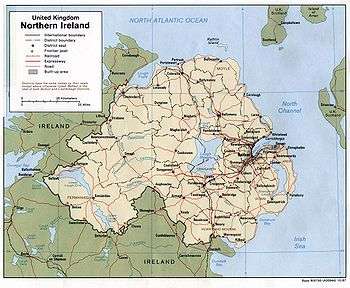Stroke Country

Not the home of strokes.
The name of the entry is a reference to a local joke name for the city of Londonderry/Derry. That thing between the words "Londonderry" and "Derry" is called a "stroke" in some versions of English. An American would call it a "slash", which could have some pretty strange unintended implications (William of Orange/James II Foe Yay?). The city is officially called Londonderry, but has a City Council that calls it "Derry". An attempt to compromise is "The Maiden City", since it wasn't breached in a 1689 siege.
Roughly, Northern Ireland/Ulster/The Province/Norn Iron/The Occupied Six Counties/the North of Ireland/British-occupied Ireland/The Fourth Green Field/Tuaisceart Éireann/Norlin Airlann. People can't even agree on the name of this place: choosing whether to say "Londonderry" or "Derry" is equivalent to coming down on one side or the other of The Question. No wonder The Troubles were so bad. Northern Irish is, sadly, perceived as one of the worst UK accents - whether this is because of the association with The Troubles is a question for scholars. Of course, there is an alternate argument which contends that the Northern Irish accent is merely incomprehensible and vaguely threatening which makes it sound worse than it really is. This doesn't stop either the English or Americans incessantly crying, "Oh, I just LOVE your accent. So quaint!".
In Dublin, Stroke Country is generally referred to simply as "the North", except in official documents and the news (though sometimes they will use 'the North' too). This is probably not politically motivated as most people in Northern Ireland refer to the Republic as "Down South" or simply "the South". Old-fashioned Irish nationalists might refer to "the Occupied Six" etc. People who want to make a point of how unnationalist they are will use "Northern Ireland", even in casual conversation.
"Ulster" is never used in the south, because only two-thirds of the old province of Ulster is in the North (er... you know what I mean). The remainder (Donegal, Monaghan and Cavan) are not.
Conversely, 'Ulster' is widely used by unionists of various hues, as is "the Province". Technically both are inaccurate, but the second one is considerably less politicised and is often used elsewhere in the UK - the BBC often refers to the area as "the Province".
Its people are generally laid-back, but a little more grim and stoic than the Republic. They can, amusingly, claim dual citizenship; forms for both Irish and British passports sit side by side in post offices.
The local flavour of ITV, UTV (or until 1993, Ulster Television - it changed its name mainly to get advertisers to sell to its thousands of viewers in the Republic), used to embody 'regional programming' (teatime "good news" programme before the proper news, replacing Tonight with Trevor Mc Donald with an actual current affairs programme, a Friday night live chat show that ran for 16 years), but, apart from continuity announcements to soap operas by this guy (who really is a trope unto himself), it's now a reskin of ITV 1 with regional news. This is an improvement.
The BBC's NI branch is mostly the same as in Britain, though it did give us Give My Head Peace, which helped launch the television careers of 'The Hole in the Wall Gang'.
Stroke Country has produced several notable figures in entertainment and the arts, though internationally they are usually identified as either or Irish or British rather than Northern Irish as such - thus Liam Neeson and Seamus Heaney - from Nationalist backgrounds - are universally considered 'Irish' while Kenneth Branagh and ~C. S. Lewis~ - from Unionist backgrounds - are almost universally considered 'British' (despite both identifying culturally as "Irish"). An exception to this rule is curmudgeonly singer/songwriter Van Morrison. Although born a Belfast Prot, from the ultra-Loyalist Sandy Row area of the city, he is universally thought of as Irish and has never contradicted this
Fiction set in Northern Ireland that doesn't involve The Troubles:
- Hellsing (end of OVA episode 1)
- Mobile Suit Gundam (the episode 'Char Returns' is set in Belfast, as are several levels in the videogames based on the original series)
- Mobile Suit Gundam 00 also mentions the land, but it does involve The Troubles.